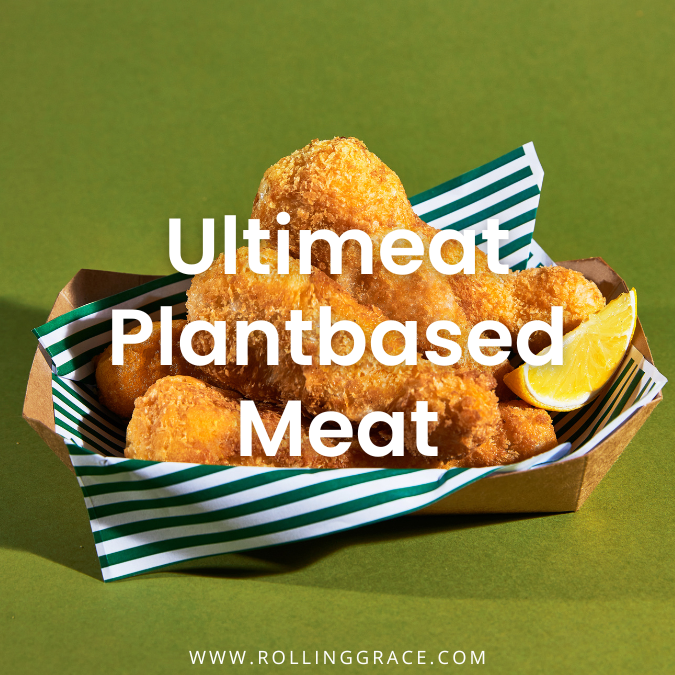Ultimeat Plant-Based Meat: Healthy & Sustainable Eating in Malaysia
Read more: Causes of Food Waste in Malaysia
Table of Content
- Problem with Meat Production & Consumption
- Benefits of Plant-Based Diet
- Ultimeat Plant-Based Meat
- Science and Technology Behind Ultimeat
- Future of Plant-Based Eating in Malaysia
- Overcoming Obstacles to Mainstream Adoption
- Tips to Transition to Plant-Based Diet
- Ultimeat & Nimbus Restaurant Collaboration
 |
| Ultimeat Plant-Based Meat: Healthy & Sustainable Eating in Malaysia |
Ultimeat Plant-Based Meat: Healthy & Sustainable Eating in Malaysia
Problem with Meat Production & Consumption
Benefits of Plant-Based Diet
Switching to a more plant-based diet offers numerous benefits for human health, the environment, and animal welfare. Here are some of the top reasons to reduce meat consumption and eat more plant-based foods:Lower Environmental Impact
Animal agriculture is incredibly resource-intensive, requiring massive amounts of land, water, and energy. Beef production alone accounts for 41% of all greenhouse gas emissions from livestock. In contrast, plant-based foods have a much smaller environmental footprint. If the world went vegan, food-related emissions could drop by 70% by 2050.
Reduced Risk of Chronic Diseases
Study after study has linked regular meat consumption, especially red and processed meats, with increased risk of heart disease, stroke, diabetes, and certain cancers. Plant-based diets high in fruits, vegetables, whole grains, nuts and legumes have been shown to reduce inflammation, lower cholesterol, and decrease risk of chronic illnesses.
Avoiding Cruel Factory Farming Practices
Over 95% of meat, dairy and eggs in Malaysia come from industrial factory farms that prioritise profit over animal welfare. Animals raised in cramped, filthy conditions often need antibiotics and drugs just to survive. By choosing plant-based options, consumers can avoid supporting these unethical practices.
Transitioning to a more plant-based diet is a powerful way to minimize one's impact on the planet, take charge of health, and avoid contributing to animal cruelty. With innovative options like Ultimeat, it's easier than ever to reap the benefits of plant-based eating.
Ultimeat Plant-Based Meat
Ultimeat is leading the plant-based meat revolution in Malaysia with its innovative range of meat alternatives made from natural, wholesome ingredients. The company offers a variety of plant-based beef, chicken, pork, seafood and egg products that replicate the taste, texture and nutrition of conventional meat and eggs.The Ultimeat burger patties come in original, spicy and smoky BBQ flavours. They have an impressively meaty texture and juiciness from ingredients like pea protein, coconut oil and beetroot powder. The chicken nuggets mimic the crispy outside and tender inside of real chicken with a breadcrumb coating over a soy and wheat protein base. The 'fish' fillets capture the flaky texture of white fish using konjac root, chickpea flour and seaweed.
All Ultimeat products are free from artificial flavours, preservatives and cholesterol. They provide a healthful option high in fibre, vitamins and minerals compared to animal products. The production process is sustainable, using significantly less water, land and energy than livestock farming.
For those seeking a nutritious, ethical and environmentally friendly alternative to meat and eggs, Ultimeat delivers on all fronts with its mouthwatering plant-based innovations. Their products cater to flexitarians, vegetarians, vegans or anyone looking to cut down on meat for health or sustainability reasons. With Ultimeat, you don't need to compromise on taste or nutrition to make more planet-friendly food choices.
 |
| The launch of Ultimeat Mycoprotein at Nimbus Restaurant, Damansara |
Science and Technology Behind Ultimeat
Ultimeat utilises innovative food science and technology to create plant-based meat alternatives that replicate the taste, texture, and nutrition of real meat.The company employs food scientists, chefs, and engineers who experiment extensively with different plant-based ingredients to mimic the fibrous texture and savoury umami taste of meat. They use a proprietary blend of pea protein, soy protein, vegetable extracts, and natural flavours to recreate the juicy, satisfying mouthfeel of beef and chicken.
Ultimeat's products leverage cutting-edge manufacturing techniques like high-moisture extrusion and heating, cooling, and pressing to align plant proteins in meat-like structures. This gives their plant-based beef and chicken the same stringy, chewy consistency as the real thing. Their chicken even has visible grain and fibres like whole muscle chicken breast.
The brand's commitment to advanced food technology ensures their products match the sensory experience of meat while providing the health and environmental benefits of plants. Their team of culinary innovators and scientists are constantly improving recipes and processes to make plant-based eating more delicious and realistic.
 |
| Edwin Lee, the Founder and CEO of Ultimeat |
Future of Plant-Based Eating in Malaysia
The plant-based food movement is rapidly gaining momentum in Malaysia, with projections that the market for meat and dairy alternatives could grow over 20% annually over the next few years. This exceptional growth is being driven by increasing health consciousness among Malaysian consumers, combined with a rising awareness of the environmental impact of animal agriculture.As the plant-based trend goes mainstream, consumers can expect far greater availability and affordability of meat and dairy alternatives across retail outlets, restaurants and eateries. Exciting new start-ups like Ultimeat are leading the way, using advanced food technology and culinary innovation to create tasty, nutritious and sustainable plant-based meat and dairy that rivals animal products. With an ever-expanding variety of plant-based options, from burgers to sausages, ice cream to cheese, the possibilities are endless.
Malaysian-grown start-ups like Ultimeat are playing a pivotal role in driving this plant-based movement, creating locally-relevant products catered to Malaysian tastes and dietary preferences. By leveraging food science and clever marketing, they are overcoming perceptions that plant-based eating is boring or unsatisfying.
Overcoming Obstacles to Mainstream Adoption
Transitioning to more plant-based foods faces several obstacles on the path to mainstream adoption in Malaysia. Many consumers perceive plant-based meats to be overly processed or unhealthy. While new food technologies are used to create the taste and texture of real meat, the ingredients are derived from plants and go through similar safety checks as other foods.Price competitiveness with animal meat is another hurdle, but economies of scale and advances in food tech are helping drive down costs substantially. As demand rises globally, plant-based meat prices are becoming on par or even cheaper than beef and chicken in many markets. To boost affordability in Malaysia, brands need to increase localised production and secure retail distribution deals.
Mainstream acceptance requires getting restaurants, retailers and brands to feature plant-based options. This involves demonstrating strong consumer demand, providing meat alternatives that easily substitute into existing menus and dishes, and pitching the sustainability benefits. Early adopters who take the leap often gain goodwill and media attention for promoting healthy, humane and eco-friendly eating. Malaysia has tremendous opportunity to show regional leadership in plant-based dining.
Tips to Transition to Plant-Based Diet
Transitioning to a more plant-based diet doesn't have to be an all-or-nothing approach. Here are some tips for gradually incorporating more plant-based meals into your routine:Start by designating one day a week as a "Meatless Monday." Commit to keeping all your meals on Mondays 100% plant-based. This small change makes a big difference over time.
When dining out, seek out vegetarian and vegan options on the menu. Most restaurants now offer meatless entrees and sides. Ask about ingredient substitutions to "veganise" a dish if needed.
Get acquainted with meat alternatives like tofu, tempeh, and seitan. Learn simple ways to prepare them at home for dinner. Ultimeat products can also help you recreate the taste and texture of meat.
Experiment with different plant-based proteins like beans, lentils, nuts, and seeds. Try adding them to soups, salads, grain bowls, and other dishes.
Replace half the meat in recipes like chili, pasta sauce, or burgers with mushrooms, beans, or lentils. You still get the flavour but increased nutrition.
When grocery shopping, seek out the plant-based milk, cheese, yogurt, and egg substitutes now available. Use them for cooking and baking.
Instead of focusing on what you cut out, focus on all the delicious fruits, veggies, grains, and other plant foods you can now enjoy more of.
With a flexible, step-by-step approach, shifting toward plant-based eating is very doable. The options and alternatives keep improving too.
Ultimeat & Nimbus Restaurant Collaboration
Ultimeat has woven a partnership with the acclaimed Nimbus Restaurant, presenting a Mycoprotein-Inspired Menu that not only stimulates the taste buds but also honours Mother Earth. This exclusive table-side revolution comes just in time for World Earth Day, a nudge to what dining can look like when we saunter down the sustainable path.With jubilance, Edwin Lee of Ultimeat shares, “Introducing mycoprotein to Malaysian consumers is our toast to sustainability and nutrition.” Chef Fred Choong of Nimbus echoes this merriment, “Marrying mycoprotein with our menu illustrates the allure of health through delightful bites—it’s where future dining pirouettes with tradition.”
 |
| Chef Fred Choong of Nimbus Restaurant |
 |
| Pineapple Granita with plantbased meat floss - A refreshing and tropical frozen treat, perfect for cooling down on a hot day. |
 |
| Smoked Mycoprotein Risotto - A creamy and smoky risotto featuring protein-rich mycoprotein, crafted for a delicious and nutritious meal. |
 |
| King Oyster Mushrooms - Sautéed to perfection, these hearty mushrooms offer a rich and savoury flavour. |
The environmental, health, and ethical benefits of shifting towards plant-based diets are clear. Research shows that reducing meat consumption and increasing plant-based foods can significantly lower an individual's carbon footprint, reduce risk of chronic illnesses like heart disease and diabetes, and eliminate the ethical concerns around factory farming.
Ultimeat is at the forefront of innovation in the plant-based meat industry. By utilising advanced food science and technology, Ultimeat has succeeded in creating plant-based meat alternatives that truly mimic the taste, texture, and sensory experience of real meat. Their products, like the Ultimeat Burger and Ultimeat Chicken Nuggets, are nutritionally sound and made from natural plant-based ingredients.










Comments
Post a Comment